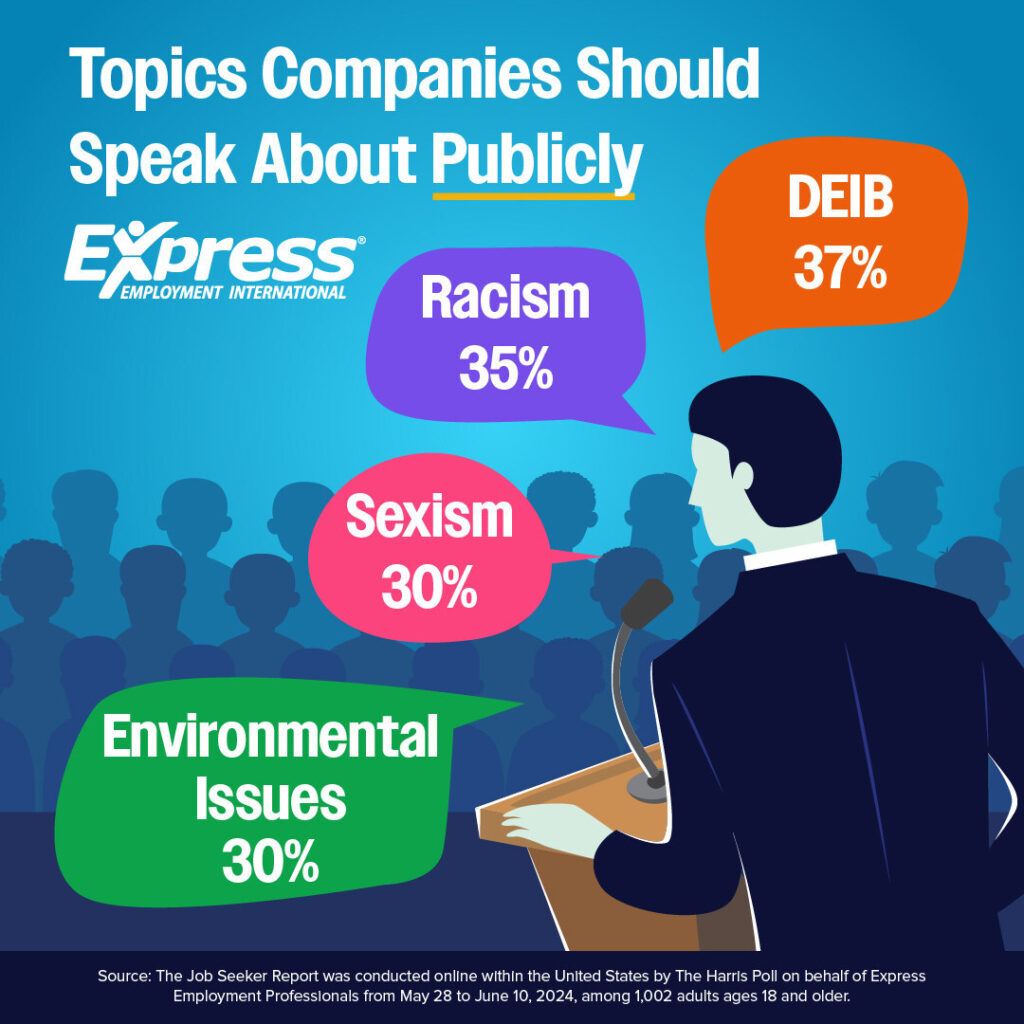As Gen Z and millennial workers flood the talent pool, silence on social issues could cost employers top talent, according to a new study.
A recent Express Employment Professionals-Harris Poll survey found that 65% of job seekers believe it’s important for their current or future employers to take a stance on key issues. Nearly half (49%) would consider quitting if they disagree with their employer’s position.
This demand represents a significant shift, fuelled by a new generation that sees corporate values as a crucial part of a company’s brand. Issues such as diversity, equity, inclusion, and belonging (DEIB) are now expected parts of a company’s public profile, ranking highest in job seekers’ priorities (37%), followed by racism (35%), environmental issues (30%), and sexism (30%).
HIGH COST OF STAYING SILENT
The pressure to speak up isn’t just coming from job seekers. Sixty-five per cent of US hiring managers believe companies should take a public stance on DEIB (30%) and racism (30%) to attract top candidates. Gen Z and millennial job seekers, in particular, expect it, with 54% and 58% of each group indicating they’re more likely to work for companies that take a stand – compared to only 34% of Boomers. Furthermore, 40% of all job seekers say they are less likely to apply to companies that remain silent on key issues.

As Express Employment International CEO Bill Stoller explained, “Every company must thoughtfully choose which issues to take a stance on, based on their values and the needs of their stakeholders. It’s about finding the right balance between staying true to the company’s mission and addressing the concerns that matter most to their employees and customers.”
SOCIAL ADVOCACY
But the stakes are high. While social advocacy can attract candidates, it can also deter others, particularly when it comes to divisive political stances. Over 60% of job seekers say a company’s political views factor into their decision to apply, and 66% believe that taking political stances can do more harm than good in attracting quality candidates. Yet, paradoxically, 61% prefer working for companies that publicly support issues they care about, even if that risks alienating others.
Many hiring managers share these concerns, with 78% agreeing that taking a stance on political issues could backfire. The tension between aligning with employee values and maintaining a broad appeal is very real. Some companies might have the bandwidth to navigate this complexity – others might see it as a no-win situation.
NAVIGATING SOCIAL EXPECTATIONS
For companies, the challenge is balancing authenticity with strategic restraint. Nearly 20% of hiring managers say they’ve encountered job applicants or current employees who question the company’s views on DEIB (22%), politics (20%), and free speech (19%), with additional inquiries on environmental issues, racism, religious freedom and sexism. And employed job seekers are also pushing back, with 24% reporting they’ve challenged their companies on racism and sexism and 23% on free speech.
This shift is a signal that companies need to tread carefully while engaging in social discourse. “The data shows that people want to work for organisations that are aligned with their values, but those values can vary widely,” says Stoller. “Companies that choose to take a stand on important issues need to ensure that it’s done thoughtfully and transparently.”
PURPOSE-DRIVEN STRATEGY IS KEY
While navigating social issues has never been easy, today’s job market demands a careful approach. The right move for employers? Know your audience. Take a stand on issues that align closely with your mission and values. Listen to employee concerns, but don’t rush into hot-button topics without a well-thought-out plan. Prioritise transparency, as younger generations have little tolerance for brands that say one thing and do another.
As workplaces evolve, there’s no one-size-fits-all strategy, but companies that manage to balance advocacy with authenticity are more likely to retain an engaged and loyal workforce. In an era where employee expectations have transformed, this balance might be one of the most critical strategies for staying competitive in the talent race.







































